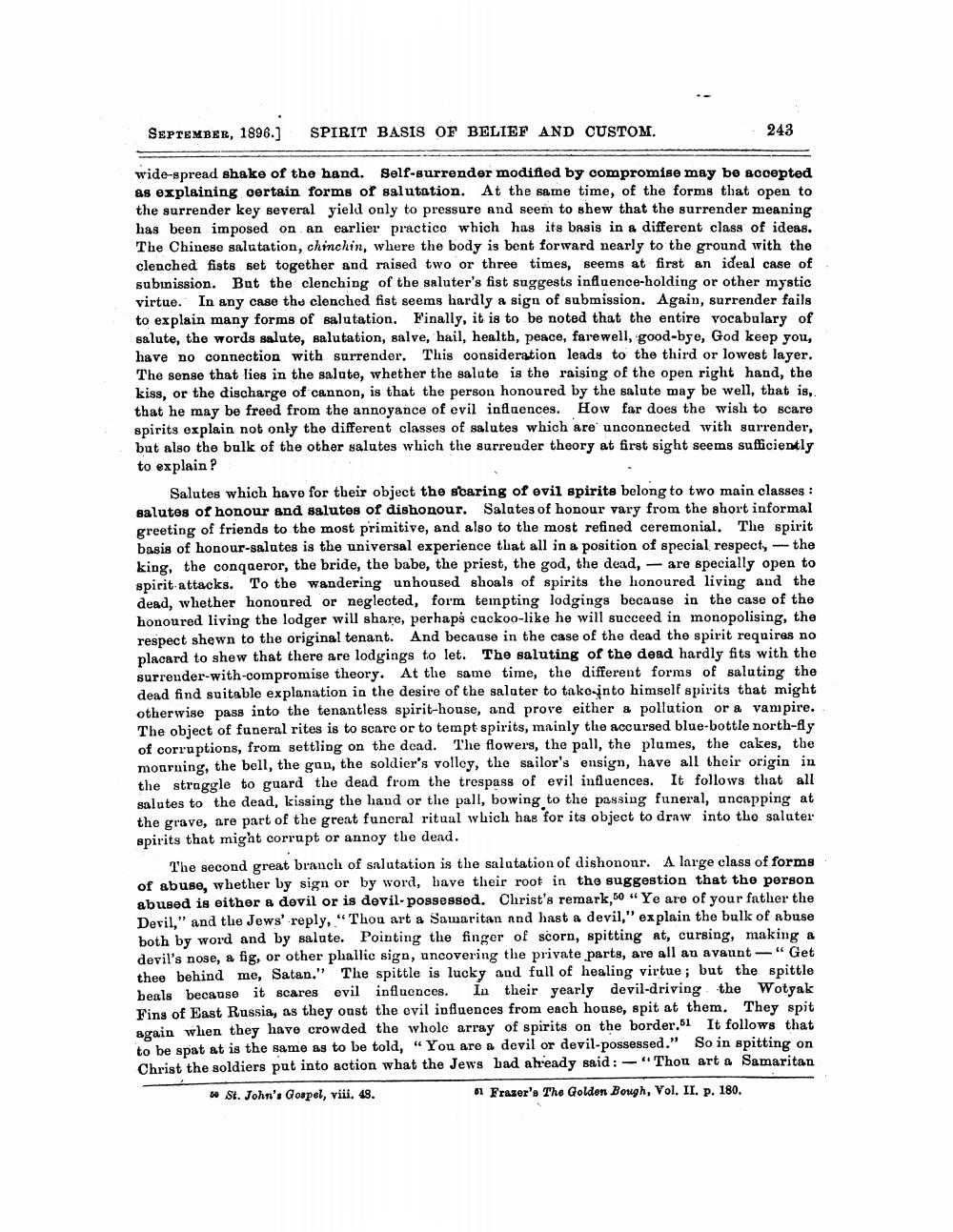________________
SEPTEMBER, 1896.)
SPIRIT BASIS OF BELIEF AND CUSTOM.
243
wide-spread shake of the hand. Self-surrender modified by compromise may be accepted as explaining certain forms of salutation. At the same time, of the forms that open to the surrender key several yield only to pressure and seem to shew that the surrender meaning has been imposed on an earlier practice which has its basis in a different class of ideas. The Chinese salutation, chinchin, where the body is bent forward nearly to the ground with the clenched fists set together and raised two or three times, seems at first an ideal case of subinission. But the clenching of the saluter's fist suggests influence-holding or other mystic virtue. In any case the clenched fist seems hardly a sign of submission. Again, surrender fails to explain many forms of salutation. Finally, it is to be noted that the entire vocabulary of salute, the words salute, salutation, salve, bail, health, peace, farewell, good-bye, God keep you, have no connection with surrender. This consideration leads to the third or lowest layer. The sense that lies in the salute, whether the salute is the raising of the open right hand, the kiss, or the discharge of cannon, is that the person honoured by the salute may be well, that is, that he may be freed from the annoyance of evil influences. How far does the wish to scare spirits explain not only the different classes of salutes which are unconnected with surrender, but also the bulk of the other salutes which the surrender theory at first sight seems sufficiently to explain ?
Salutes which have for their object the scaring of evil spirits belong to two main classes : salutes of honour and salutes of dishonour. Salates of honour vary from the short informal greeting of friends to the most primitive, and also to the most refined ceremonial. The spirit basis of honour-salutes is the universal experience that all in a position of special respect, - the king, the conqueror, the bride, the babe, the priest, the god, the dead, - are specially open to spirit attacks. To the wandering unhoused shoals of spirits the honoured living and the dead, whether honoured or neglected, form tempting lodgings because in the case of the honoured living the lodger will share, perhaps cuckoo-like he will succeed in monopolising, the respect shewn to the original tenant. And because in the case of the dead the spirit requires no placard to shew that there are lodgings to let. The saluting of the dead hardly fits with the surrender-with-compromise theory. At the same time, the different forms of saluting the dead find suitable explanation in the desire of the salater to take into himself spirits that might otherwise pass into the tenantless spirit-house, and prove either & pollution or a vampire. The object of funeral rites is to scare or to tempt spirits, mainly the accursed blue-bottle north-fly of corruptions, from settling on the dead. The flowers, the pall, the plumes, the cakes, the moarning, the bell, the gan, the soldier's volley, the sailor's ensign, have all their origin in the struggle to guard the dead from the trespass of evil influences. It follows that all salutes to the dead, kissing the hand or the pall, bowing to the passing funeral, uncapping at the grave, are part of the great funeral ritual which has for its object to draw into tho saluter spirits that might corrupt or annoy the dead.
The second great branch of salutation is the salutation of dishonour. A large class of forms of abuse, whether by sign or by word, bave their root in the suggestion that the person abused is either a devil or is devil-possessed. Christ's remark,50 "Ye are of your father the Devil," and the Jews' reply, "Thou art a Samaritan nnd hast a devil," explain the bulk of abuse both by word and by salute. Pointing the finger of scorn, spitting at, cursing, making a devil's nose, a fig, or other phallic sign, uncovering the private parts, are all an avaunt -“Get thee behind me, Satan." The spittle is lucky and full of healing virtue; but the spittle beals because it scares evil influences. In their yearly devil-driving the Wotyak Fins of East Russia, as they onst the evil influences from each house, spit at them. They spit again when they have crowded the whole array of spirits on the border.51 It follows that to be spat at is the same as to be told, “You are a devil or devil-possessed." So in spitting on Christ the soldiers put into action what the Jews had already said: - "Thou art a Samaritan St. John's Gospel, viii. 48.
61 Frazer's The Golden Bough, Vol. II. p. 180.




